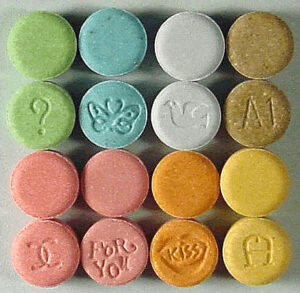Ecstasy: Healing PTSD or Killing Our Youth?

Ecstasy, the recreational rave drug, has been criticized as a drug leading to death and lauded as a drug that give life to survivors of Post Traumatic Stress Disorder or PTSD. Recently, The LA Times published an article on Ecstasy use that has led to teen deaths in LA’s rave scene. This report was followed six days later by a drastically different take on Ecstasy featured on CNN.com. The latter starkly contrasted the grim report of the LA Times as it explored Ecstasy’s efficacy in treating PTSD symptoms. Is Ecstasy solely a drug for the techno parties and rave scene? Or, can it be manufactured as a novel treatment for severe cases of PTSD and other mood disorders?
A study in the Journal of Psychopharmacology where 20 PTSD subjects where administered a controlled dosage of MDMA, the medical name for Ecstasy, resulted in each subject reportedly experiencing various levels of PTSD ranging from sexual assault to combat stress.
Twelve of the twenty participants took MDMA before speaking with a therapist for several hours. The remaining 8 subjects received a placebo, or inactive sugar pill before speaking to a therapist. Study results showed that ten of twelve participants on active MDMA improved remarkably with respect to PTSD criteria; whereas, only two of eight participants on inactive placebo saw “substantial improvement”. The article did not specify how the latter’s groups improvement compared to their PTSD symptoms.
Ecstasy elevates levels of serotonin, the neurotransmitters responsible for feelings of “well being”. It also increases levels of oxytocin which is a neurotransmitter released during pair boding such as sexual activity and breast feeding. In short, Ecstasy is a Dr. Feelgood drug.
Despite Ecstasy’s short-term pleasurable high, the drugs has long-term deleterious effects. E can induce hyperthermia, seizures, cardiac arrest and water intoxication if a person ingests too much water while under the influence of E. These negative side effects of E result from the uncontrolled use of synthesized MDMA.
All drugs, both recreational and medically controlled, have minor to major discomforts that result from taking them. Questions to be considered include a list of the negative side effects of the medical use of MDMA in a controlled setting. How do these harmful effects of MDMA use compare to the illicit use of street Ecstasy?
If there isn’t a noticeable difference in adverse side effects, and if participants didn’t report Severe Adverse Events, in a controlled setting, MDMA may become a novel treatment for severe PTSD. In such case, soldiers returning from combat, prisoners of war and other traumatized individuals may find MDMA in tandem with therapy ameliorates their PTSD symptoms. The distance from the street pharmacy to the medical pharmacy is only National Institute of Health and FDA approval away.